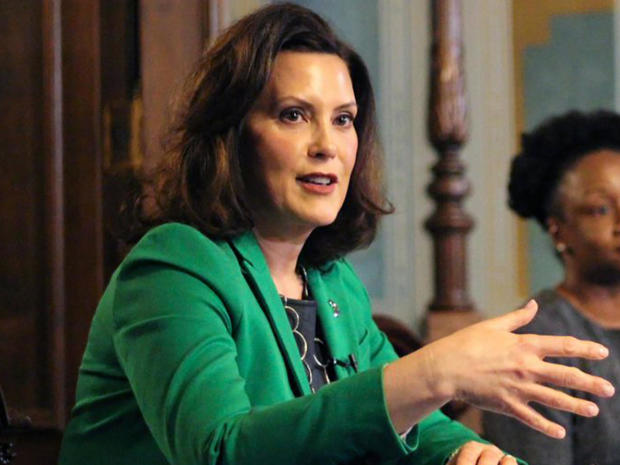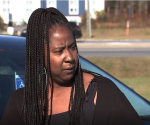Michigan Governor Gretchen Whitmer extends stay at home order despite protests
[ad_1]
Michigan Democratic Governor Gretchen Whitmer issued three new executive orders Thursday night that extend Michigan’s state of emergency through May 28 amid the coronavirus pandemic. The actions could provoke legal challenges from the state’s Republican-controlled legislature.
Whitmer used one executive order to terminate Michigan’s current state of emergency, which was set to expire Thursday night, and cited two emergency powers laws, one from 1945 and another from 1976, as the legal basis for unilaterally extending the state of emergency. Whitmer indicated she will continually evaluate the need for both executive orders and will “terminate the states of emergency and disaster if the threat or danger has passed.”
The state of emergency gives Whitmer the authority to issue executive orders related to coronavirus, such as a stay-at-home order which is in effect until May 15. On Thursday night, Whitmer also signed an executive order keeping bars, gyms, casinos and theaters closed and only allowing restaurants to do delivery or takeout service through May 28.
GOP legislative leaders say the legislature has the authority to extend the state of emergency, not Whitmer, and declined to do so Thursday. Republicans have pushed back against some aspects of the stay-at-home order and urged Whitmer to restart parts of the state’s economy soon.
“We remain in the state of emergency,” Whitmer said during a town hall Thursday night. “That is a fact. For anyone to declare ‘mission accomplished’ means that they’re turning a blind eye to the fact that over 600 people have died in the last 72 hours.”
The executive orders come a day after Whitmer rejected a Republican proposal that offered two one-week extensions to Whitmer’s emergency powers in exchange for a public agreement that future stay at home orders will require legislative approval.
Earlier on Thursday, both the Michigan House and Senate passed resolutions giving their leaders power to take legal action against Whitmer over her coronavirus response.
“Any attempt by Governor Whitmer to unilaterally extend the states of emergency and disaster past April 30, 2020, without legislative approval would be contrary to both law and Michigan’s constitutional system,” both resolutions say.
On the Senate floor Thursday night, Senate Majority Leader Mike Shirkey, a Republican, indicated a court battle would be coming.
“If she does not recognize the end of the emergency declaration, we have no other choice but to act for our constituents,” Shirkey said.
Whitmer’s office said in a press release that she intends to veto a bill passed by the Legislature on Thursday which would have codified some of her coronavirus executive orders until their expiration dates. The bill would not have extended the state of emergency and did not codify her stay at home order.
As the legislature met on Thursday, hundreds of protesters gathered at the Capitol building in Lansing to voice frustrations about the stay home order, including some who were armed and entered the Capitol. Democratic State Senator Dayna Polehanki tweeted a photo of armed protesters in the Senate gallery. People are allowed to openly carry guns inside the Michigan Capitol building.
As of Thursday, Michigan has reported 41,379 cases of coronavirus and the virus has caused 3,789 deaths in the state. More than a million Michiganders have filed for unemployment, as businesses have been forced to close to slow the spread of the virus.
An emergency powers law from 1945 does not mention that a governor needs legislative approval to issue “reasonable orders,” but a separate law, the Emergency Management Act of 1976, states an extension of a state of emergency requires legislative approval.
Richard Primus, a constitutional law professor at the University of Michigan, says the 1976 law doesn’t impact the authority Whitmer has from the 1945 law. He notes that the 1976 emergency powers law says the act is not supposed to “limit, modify, or abridge the authority of the governor to proclaim a state of emergency” that exists under the 1945 law.
“The ’76 act creates a bunch of provisions for emergencies that the governor would not have been able to do or change by herself under the ’45 act,” Primus said. “But it takes special care to say we are not messing with the law’s previous apparatus for executive authority in emergencies.”
Michigan Office of the Governor via AP
The tensions between the governor and the legislature over executive emergency powers have been simmering since a large protest in Lansing earlier this month against a previous version of Whitmer’s stay-at-home order. The current order removed some restrictions that critics viewed as arbitrary, such as a travel ban between homes, rules prohibiting certain activities and requiring certain areas of stores to be blocked off.
On Monday, Whitmer revealed preliminary details of her proposal to start reopening the parts of the Michigan economy. Her plan breaks the state into different regions and evaluates geographic and workplace risk. She announced Wednesday that she plans to sign an executive order Friday that will allow commercial and residential construction to resume operating on May 7 because it is a “lower risk enterprise.”
Despite the vocal criticism from the president and some Michiganders, a Detroit Regional Chamber poll released last week showed 57% of Michiganders approve of Whitmer’s handling of the coronavirus pandemic.
[ad_2]
Source link











